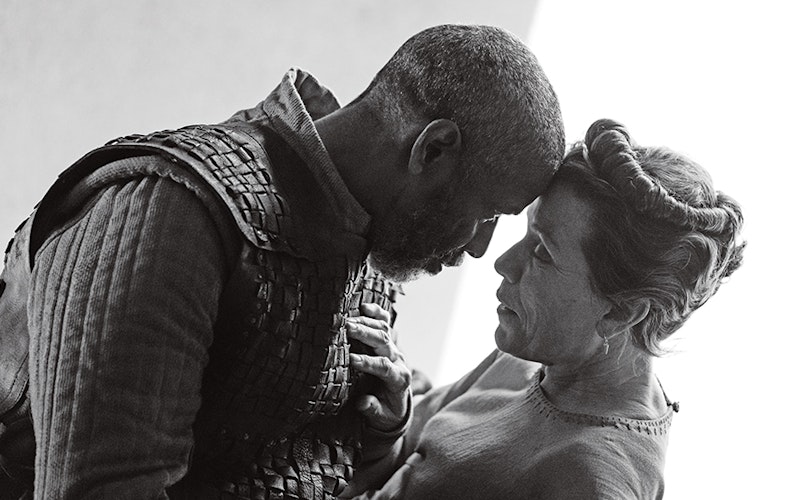
Movies
The Old Testament Tragedy of Macbeth
In the vein of the MCU series What If . . ., let me pose a question: What if . . . Romeo and Juliet never died, but instead married and grew older together?
If you ask Frances McDormand, she would say they’d grow up to become Macbeth and Lady Macbeth. Discussing The Tragedy of Macbeth, in which she and Denzel Washington play the central couple, she said: “[The] Macbeths met when they were 15. They were Romeo and Juliet, but they didn’t commit suicide. They just stayed married for 50 years.”
McDormand’s words changed how I viewed this filmed version of Shakespeare’s play, adapted and directed by McDormand’s husband, Joel Coen. Perhaps this reveals more of my bias, but while reading the play I always envision youthful to middle-aged actors in the roles. The sloppiness of the couple’s murderous plan, born from a desire to carve a name for oneself, seemed characteristic of a hungrier, younger pair, who might have let passion eclipse careful execution.
When we meet the older Macbeth, the Thane of Glamis, and his wife in The Tragedy of Macbeth, the two seem more resigned to live out their days with the current status quo than commit regicide. “They’re a couple at the end of their ambition, not at the beginning of their ambition,” McDormand said in that New York Times interview. Indeed, gone is the amorousness of the couple’s “Romeo and Juliet” days. Passion has hardened into a more grounded love. Still, they can’t help but wonder if their best days are behind them.
By casting an older actor and actress, Tragedy places the Macbeths in the same age bracket as King Duncan (Brendan Gleeson), whom they’ll eventually murder in order to claim the throne. (Washington is 67, McDormand is 64, and Gleeson is 66.) This changes the power dynamic, as Macbeth is now less of a subordinate and more of a peer. Read another way, they’re two men similar in age, but one of them got the lion’s share of success as king. Resignation turns into insatiable zeal when Macbeth is visited by three “weird sisters.” (Really just one fantastic Kathryn Hunter, delivering a vocal, three-course dish of charisma.) When the witches tell Macbeth that he will not only be Thane of Cawdor, but eventually crowned king, Macbeth’s contentment wavers. This revelation represents a second chance, an opportunity to change his future before old age overtakes him.
Visually, The Tragedy of Macbeth matches this theme of open possibility with on-screen spaces and voids. In a stunning scene, after the Thane of Cawdor is executed for treason and Macbeth receives his title (thereby fulfilling one part of the prophecy), Macbeth takes a stroll out in the night. The stars are luminous and the heavens seem to touch the gritty earth; you almost can’t tell whether Macbeth walks in space or on ground. The vastness of the cosmos is before him, as if to suggest that the possibilities for him and Lady Macbeth are now endless. He murders the king not too long after, with her help. Then they slaughter former friends and servants to keep their power and cover up their tracks.
The prophecy represents a second chance, an opportunity to change their future before old age overtakes them.
The Tragedy of Macbeth offers an invitation for believers to interrogate our own hearts and history, to see the ways we try to seize control of our lives. Consider the story of Abram and Sarai. The two were long past childbearing age when God made them this promise: “Look up at the sky and count the stars—if indeed you can count them. . . . So shall your offspring be.” As more time passed without heirs, the two took matters into their own hands, exploiting and abusing their servant Hagar. When God reiterated his promise, Abram and Sarai laughed. Rather than bring their doubts to God they instead attempted to seize power and control.
The ending of The Tragedy of Macbeth encapsulates the cost of misplaced faith and unchecked aspiration. During a climactic showdown, Macduff (Corey Hawkins) spars with Macbeth and knocks off his crown. Rather than attack or defend himself, Macbeth scrambles to retrieve the fallen crown. As he joyously puts it back on his head, Macduff beheads him. The crown, which he so desperately thought would bring him life, has led him to the grave.
This story doesn’t leave much room for hope. Both Macbeths lie dead, in bloody graves of their own making. The only twisted comfort is that they reaped what they sowed. A similar fate should have befallen Abram and Sarai, but God remained faithful to them, honoring his promise of providing an heir. Indeed, the scandal (and hope) of the gospel is that even if our sinful acts killed the king, he remains faithful to us. The daggers we draw in attempts to seize control of our lives may pierce Jesus on the cross, yet his sacrifice means we don’t get what we deserve.
Topics: Movies